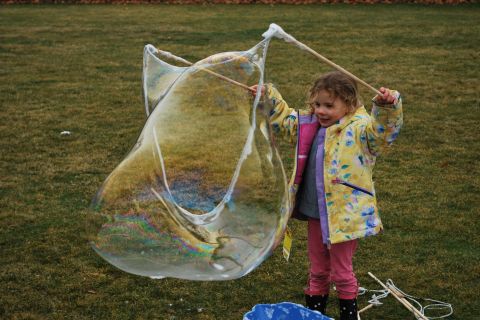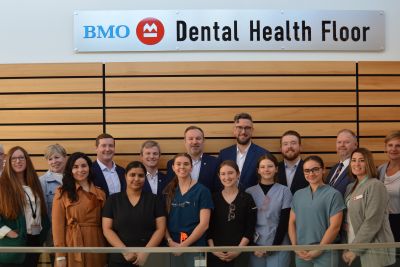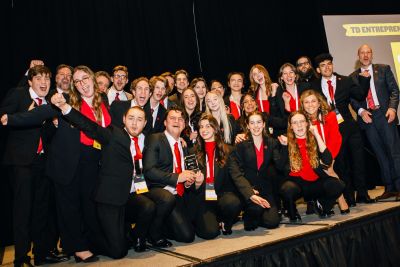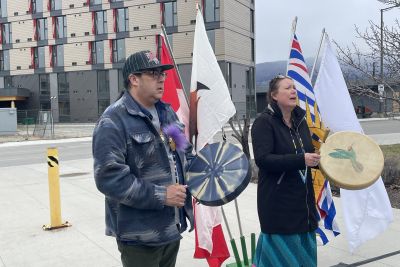How to play in today’s reality: A Q&A with Beverlie Dietze, Play Expert

Social-distancing is the name of the game for all of us right now. But getting outside, whether it be in your backyard or your neighbourhood, when following the province’s guidance, remains an important way for us to keep moving says an Okanagan College outdoor play expert.
In early March, before the onset of COVID-19 halted such gatherings, the College hosted an outdoor play workshop alongside Outland Design and New Monaco in Peachland. This unique opportunity gave residents a chance to learn more about outdoor and unstructured play, and also gave children a chance to play with loose parts. The workshop also collected feedback from families and children on play preferences, including types of materials, activities and spaces.
With the emergence of COVID-19, the College’s Learning and Applied Research department has shifted its focus to facilitating connectivity for the College community. However, Beverlie Dietze, Director of Learning and Applied Research and Education Technology at Okanagan College, recently took a few moments to share her perspective on the future of play, and how families can still stay connected and get outside.
Question 1: Can you tell us about the workshop the College hosted in early March in Peachland, and what it entailed?
Beverlie Dietze (BD): For the past five to seven years, across Canada, governments at all levels, health care providers, education and early childhood experts have expressed concerns about children’s lack of outdoor play and experiences with the concomitant increase in childhood obesity, mental health issues and related diseases.
Many national and international researchers recognize that there are a wide range of health benefits children gain from outdoor play. New Monaco, a land developer in Peachland is in the midst of creating a new neighbourhood that has woven healthy living into many aspects of the development, including the proposed park designs. Our community event was intended for Peachland residents and others to view the park space designs and provide feedback on them.
As well, children and families were invited to engage with the types of open-ended materials that will be promoted within the new park designs. The event brought families, educators, occupational therapists, playground designers, landscape architects, city planners and others to view how simple, open environments with loose parts can influence many hours of high-quality play and learning experiences for and with children.
Question 2: For families who are struggling with being indoors more than they usually would right now, how can being outside benefit their health and wellbeing?
BD: Children’s social, emotional, cognitive and physical development is influenced by their connections to nature. Children need nature, sun, space, and play. Outdoor play experiences are connected to later academic performance, health status, and care of the environment.
Outdoor play is where children can develop their ecological self. Children who have access to outdoor play on a daily basis exhibit lower stress levels, are fitter and leaner, have stronger immune systems reducing the number of colds, flus and related illnesses, have more active imaginations and communication skills, exhibit higher levels of curiosity which in turn influence their academic learning. Children who play outdoors have more self-confidence with peers, less bullying behaviours, and abilities to formulate relationships. Indoor environments do not provide children with these same opportunities and in some instances, will not address the developmental domains.
As Dr. Bonnie Henry has identified, being outdoors is important. We encourage families to go outdoors and play together as a family. Although other families are unable to join in the play, families can share ideas back and forth digitally about what they are doing with their children. For example, one family may decide to gather sticks from the nearby forest that children require to build a den. Other families may do the same and then share photos or have children facetime the other children as they build their den.
We understand that parents are navigating unprecedented waters alongside their children, and many parents are making the transition to working from home. We are all faced with challenges but there are opportunities to divest from screens and in this instance, parents can lead the charge. Instead, encourage children to use the “gadgets” such as their phones to find particular items in their neighbourhood – have families develop scavenger hunts in the neighbourhoods and share digitally with families for them to use.
Children who are not use to spending time outdoors may also need specific projects offered such as building bird houses and painting them. We need adults to be creative to connect their children to the outdoor spaces that do not violate social distancing.
Question 3: What benefits are there for kids and families with outdoor play?
BD: Think about the types of games children can play – what are those old-fashioned games that children may not have learned? What kinds of materials can the children use to create things with? What old electronics might be available for the children to take apart and make discoveries? The more children can engage in the outdoors with opportunities to seek vitamin D and movement, as well has the reduction of germs spreading from the indoors, the healthier they will be.
Question 4: How has technology changed the way families play?
BD: Many children have lost the skills of how to play. It is not only the technology that has eroded children’s play, it is all of the organized events that they partake in – swimming, ball, music lessons – etc. They don’t have free time now to just play – perhaps this is one of the rainbows that we can see in this situation. Bringing back outdoor play to children will be one of the most significant child development gifts we can give a child.
Question 5: How do we strike a balance between going outdoors and being active, yet maintaining and respecting the requirements and recommendations of our current reality?
BD: Children and their families need to play together – but connect with other families electronically to share what kinds of play occurs. Think about the pleasure that seniors take from watching children play – another reason why we need to make children’s outdoor play visible.
As the College continues to navigate the COVID-19 pandemic, resources are available to students, staff and faculty to promote connectivity, maintain learning and reduce feelings of isolation. One of those resources includes Blackboard Collaborate, which Learning and Applied Research is using to facilitate online classes. To date, there have been over 380 individual engagements on the platform, across a variety of departments on all four campuses. Blackboard Collaborate continues to extend the classroom setting to students, enabling the continuation of learning.
For creative ideas available to families, head here for a comprehensive list of websites offering alternative ways to play, from forts to puzzles, crafts and adventures.
To learn more about resources available at Okanagan College, go here.
Tags: Partnership, Play, Learning and Applied Research





